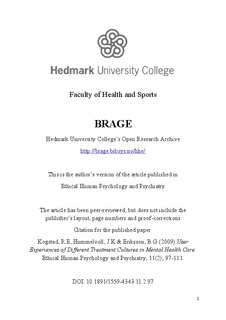User Experiences of Different Treatment Cultures in Mental Health Care
Journal article, Peer reviewed
Permanent lenke
http://hdl.handle.net/11250/134222Utgivelsesdato
2009Metadata
Vis full innførselSamlinger
Originalversjon
Kogstad, R.E, Hummelvoll, J.K & Eriksson, B.G (2009) User Experiences of Different Treatment Cultures in Mental Health Care. Ethical Human Psychology and Psychiatry, 11(2), 97-111. http://dx.doi.org/10.1891/1559-4343.11.2.97Sammendrag
Background: Clients have mixed experiences with mental health services. Historically there have been quite different and also incompatible approaches to treatment in mental health care. Some antagonisms may have been overcome, but clients' experiences still seem to mirror approaches that are in contrast to each other. Aim: To describe different treatment approaches as clients experience them, discuss essential factors in, and differences between the approaches and the degree to which they appear corresponding or antagonistic. Method: Qualitative content analysis of stories from approximately 492 users dealing with positive, negative, or both positive and negative experiences with the health service system. Results: Clients experience different treatment cultures side by side within the mental health care system. The cultures exist on a continuum where monologue and dialogic cultures represent endpoints. Conclusion: It is important to acknowledge the contrasts clients have experienced between different treatment cultures. Realizing the contrast between approaches, it emerges as important that clients are given a choice and can get the kind of treatment they prefer.
Beskrivelse
The original publication is available at: http://dx.doi.org/10.1891/1559-4343.11.2.97
